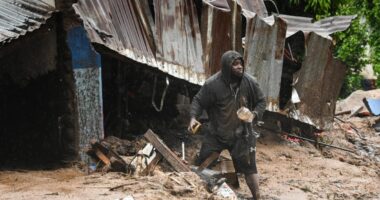
DENVER — Six months after a fire killed five members of a Senegalese family, remnants of the burned home on Truckee Street remind those in the tight-knit community that they can be vulnerable in their adopted country.
Even though police said they don’t believe the Aug. 5 fire was motivated by racial or ethnic bias, they believe it was set intentionally by three teenagers arrested last week in connection with the deaths of Djibril Diol, 29; Adja Diol, 23; their daughter, Khadija, 2; Djibril’s sister, Hassan, 25, and her baby, Hawa Baye.
“It was just a happy family that was getting everything together and starting a happy life,” said Amadou Dieng, who met Djibril Diol at a mountain Target store in 2015 when Dieng moved to Colorado from the West African nation. “If it’s not a bias crime, it’s still a crime. It’s hard for people in the community to feel safe.”
Firefighters found the bodies inside the burning house when they responded to the fire, which spared three people — members of a family that rented the home to the Diols — who jumped to safety from the second floor.
Many of the state’s 2,000 Senegalese immigrants, like Dieng and Diol, move first to towns in the Rocky Mountains to work the plentiful jobs in hospitality and retail. Senegalese who have been in Colorado the longest fled their country as refugees following a border war with Mauritania in the 1990s.
After securing their green cards, they brought their families over, many relocating to Denver, where housing is less expensive than in the ski and tourist towns that dot the Rockies.
“It still doesn’t make sense,” Dieng said last week after police announced the arrests. “I was just with Djibril the Friday before. We were celebrating Eid. We were never able to see him again.”
Diol graduated from Colorado State University with a degree in civil engineering in 2018 and was working for the construction and engineering firm Kiewit. He married Adja in Senegal before he began attending CSU, and after graduating, he returned to bring his wife and daughter to Denver. They had arrived just four months before the fire.
Denver Mayor Michael Hancock said at a news conference last week that it was one of the most heinous crimes that had ever taken place in the city.
“We would do everything we could, turn over every rock, make sure we looked at every nook and cranny to make sure this crime was solved,” Hancock said.
The suspects, two 16-year-olds and one 15-year-old, are expected to be charged with 28 counts, including first-degree murder and arson, some with “extreme indifference” to human life, which carry stiffer sentences.
Surveillance video captured them wearing hoodies and masks and driving a dark-colored four-door sedan, investigators said. A $50,000 reward had been offered for information leading to the arrests.
“We are grateful, but we are still in pain,” said Papa Dia, a spokesperson for the family, after the arrests.
Dia, founder of Colorado’s African Leadership Group, was among those who demanded that the fire be investigated as a bias crime. The Senegalese government, which followed the case closely, also wanted it to be investigated as a hate crime.
“We know it’s not going to bring these beautiful people back,” Dia said last week. “Let’s not let this horrific crime define who we are as a nation and who we can be as a state.”
Aliou Ba, who immigrated from Senegal to Denver in 2002, lives with three generations of his family on the next street over from the Diols. They were friends and visited each other regularly. On the night of the fire, Ba said he could see the house burning from his backyard.
“I’m just wondering the reason behind it,” Ba said.
Ba’s sister, Ami, said the police came by after the arrests to tell them not to worry anymore.
“We weren’t feeling safe after that,” she said of the deadly fire. “Now we feel safe.”
Inside her house, Ami’s mother, wearing a colorful, two-piece dress of her homeland, sat on the floor with five toddlers eating spaghetti communally with their hands as is customary in Senegal.
“It doesn’t make any sense,” Ami said. “Why would you murder children? They’re just babies.”
The Denver District Attorney’s Office, which expects to receive the case from police early next week, has not said whether the three juveniles will be tried as adults.
“We have a long way to go,” Dieng said. “It’s good to know it wasn’t hate, but it would be better to know why it happened.”
Source: | This article originally belongs to Nbcnews.com









